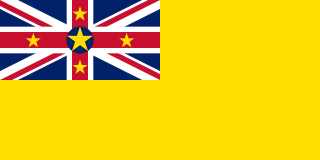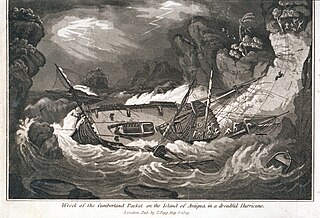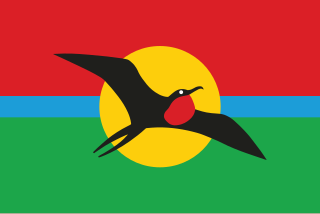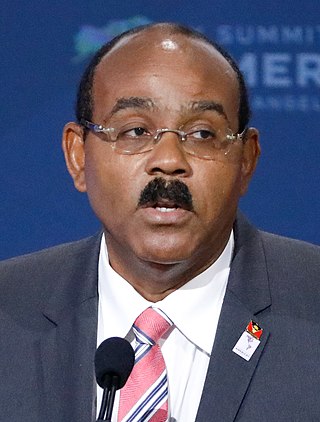
Antigua and Barbuda is a sovereign island country in the Caribbean. It lies at the conjuncture of the Caribbean Sea and the Atlantic Ocean in the Leeward Islands part of the Lesser Antilles.

The politics of Antigua and Barbuda takes place in a framework of a unitary parliamentary representative democratic monarchy, wherein the sovereign of Antigua and Barbuda is the head of state, appointing a governor-general to act as vice-regal representative in the nation. A prime minister is appointed by the governor-general as the head of government, and of a multi-party system; the prime minister advises the governor-general on the appointment of a Council of Ministers. Executive power is exercised by the government. Legislative power is vested in both the government and the two chambers of the Parliament. The bicameral Parliament consists of the Senate and the House of Representatives.

The politics of Niue take place in a framework of a parliamentary representative democratic dependency, whereby the Chief Minister is the head of government, and of a non-partisan system. Niue is self-governing in free association with New Zealand and is fully responsible for internal affairs. New Zealand retains some responsibility for external affairs, in consultation with Niue. The Niue Constitution Act 1974 (NZ) vests executive authority in His Majesty the King in Right of New Zealand and the Governor-General of New Zealand. The constitution specifies that in everyday practice, it is exercised by a Cabinet of the Premier of Niue and three other ministers. The premier and ministers must be members of the Niue Assembly, the nation's legislative assembly. The Judiciary is independent of the executive and the legislature.

The history of Antigua and Barbuda covers the period from the arrival of the Archaic peoples thousands of years ago to the present day. Prior to European colonization, the lands encompassing present-day Antigua and Barbuda were inhabited by three successive Amerindian societies. The island was claimed by England, who settled the islands in 1632. Under English/British control, the islands witnessed an influx of both Britons and African slaves migrate to the island. In 1981, the islands were granted independence as the modern state of Antigua and Barbuda.

Barbuda is an island located in the eastern Caribbean forming part of the twin-island state of Antigua and Barbuda as an autonomous entity. Barbuda is located approximately 30 miles (48 km) north of Antigua. The sole settlements on the island are Codrington and its surrounding localities. Barbuda is a flat island with the western portion being dominated by Codrington Lagoon, and the eastern portion being dominated by the low-lying Barbuda Highlands, with salty ponds and scrubland spread throughout the island. The climate is classified as tropical marine.
Antigua and Barbuda's transport systems include both public and privately run services. Roads in the country are paved and follow a winding and gently sloping course connecting parishes to villages and communities. Driving is on the left-hand side. The speed limit is set at 40 mph, Traffic signs posted throughout main roads in Antigua and Barbuda allow for ease of commute, and with GPS coordinates posted throughout the country, the process of navigation has become even easier.
Local government in Wales is primarily undertaken by the twenty-two principal councils. The councils are unitary authorities, meaning they are responsible for providing local government services within their principal area, including education, social work, environmental protection, and most highway maintenance. The principal areas are divided into communities, most of which have an elected community council. The services provided by community councils vary, but they will typically maintain public spaces and facilities. Local councils in Wales are elected; the most recent local elections in Wales took place in 2022, and the next are due to take place in 2027.

Sir Vere Cornwall Bird, KNH was the first Prime Minister of Antigua and Barbuda. His son, Lester Bryant Bird, succeeded him as Prime Minister. In 1994, he was declared a "National Hero".

Saint John, officially the Parish of Saint John, is a civil parish of Antigua and Barbuda, on the northwestern portion of Antigua island. Its capital is the city of St. John's. Saint John borders Saint Mary, Saint Peter, Saint George, and Saint Paul. Saint John faces the Caribbean Sea. Saint John is surrounded by some of Antigua's most premier beaches. Saint John had a population of 56,736 in a 2018 estimate, making it home to the majority of the population in Antigua and Barbuda.

Antigua, also known as Waladli or Wadadli by the native population, is an island in the Lesser Antilles. It is one of the Leeward Islands in the Caribbean region and the most populous island of the country of Antigua and Barbuda. Antigua and Barbuda became an independent state within the Commonwealth of Nations on 1 November 1981.

Codrington is the only major settlement on the island of Barbuda, which is part of the country of Antigua and Barbuda. Codrington coincides with the Codrington major division, one of the two major divisions on Barbuda. Situated on the Codrington Lagoon, Codrington is the nation's northernmost settlement. The population of Codrington was 796 in 2011.

The Senate is the Upper House of Parliament of Antigua and Barbuda. It consists of 17 members appointed by the Governor General. Ten members are appointed on the advice of the Prime Minister, four on the advice of the Leader of the Opposition, one on the advice of the Barbuda Council, one resident of Barbuda on the advice of the Prime Minister, and one at the Governor General's discretion. Subject to the provisions of Section 30 of the Constitution, any person who at the time of his appointment: is a citizen; is twenty-one years of age or older; has lived in Antigua and Barbuda for the twelve months immediately prior to the date of his appointment; and is able to speak and, unless disabled by blindness or another physical condition, to read the English language with enough proficiency to allow him to take an active part in the proceedings.

The monarchy of Antigua and Barbuda is a system of government in which a hereditary monarch is the sovereign and head of state of Antigua and Barbuda. The current Antiguan and Barbudan monarch and head of state, since 8 September 2022, is King Charles III. As sovereign, he is the personal embodiment of the Crown of Antigua and Barbuda. Although the person of the sovereign is equally shared with 14 other independent countries within the Commonwealth of Nations, each country's monarchy is separate and legally distinct. As a result, the current monarch is officially titled King of Antigua and Barbuda and, in this capacity, he and other members of the Royal Family undertake public and private functions domestically and abroad as representatives of Antigua and Barbuda. However, the King is the only member of the Royal Family with any constitutional role.

The Barbuda Council, officially the Council of Barbuda, is a local authority that manages the internal affairs on the island of Barbuda. The council has the authority to buy, acquire, hold, mortgage, and dispose of land and other property. It also possesses a common seal and perpetual succession. The Barbuda Council, which has the authority outlined in the Barbuda Local Government Act, is the government of the island and its coastal zone. The members of the Senate who meet the requirements outlined in paragraph (1) of section 6 of the Barbuda Local Government Act, nine elected members, and the member of the House of Representatives from the Barbuda constituency make up the Council. A Commonwealth citizen who is eighteen years of age or older, was born in Barbuda, is the child of parents who were at least one of their parents' birthplaces, or who has lived in Barbuda for at least three years prior to the date of their nomination for election, and who is a regular resident of Barbuda and a registered voter under the Representation of the People Act are all required to be eligible to be elected as a member of the Council.

All Saints is the second largest town in Antigua and Barbuda, with a population of 3,412. It is located in the middle of Antigua, at 17°3′N61°47′W. Just 5 miles NW of here is the capital, St. John's. It had a population of 3,900 in 2001.

Education in Antigua and Barbuda is compulsory and free for children between the ages of 5 and 16 years. The system is modeled on the British educational system. The current Minister of Education, Sport & Creative Industries is Daryll Sylvester Matthew.

Gaston Alfonso Browne is an Antiguan politician serving as the prime minister of Antigua and Barbuda and leader of the Labour Party since 2014. Before entering politics, he was a banker and businessman.

Trevor Myke Walker is a Barbudan politician, current member of parliament for Barbuda, and former Cabinet Minister under the Baldwin Spencer administration. He is a member of the Barbuda People's Movement, a party that seeks the independence of Barbuda from Antigua and Barbuda.

Administrative structures for municipal governments can be found on Antigua and Barbuda. It also has 17 district councils in addition to its workforce for the local government. Under the direction of the Local Government Officer, the district councils have been categorized into a total of four (4) distinct zones. At a more fundamental level, Voluntary Village Councils are strongly urged to encourage the participation of as many citizens as is humanly practicable. After that, they are consolidated into several district councils. The borders of national constituencies are mirrored in district council limits. The island of Barbuda was granted a unique status, and it was given the authority to solicit financial contributions in order to meet the needs of its inhabitants.














